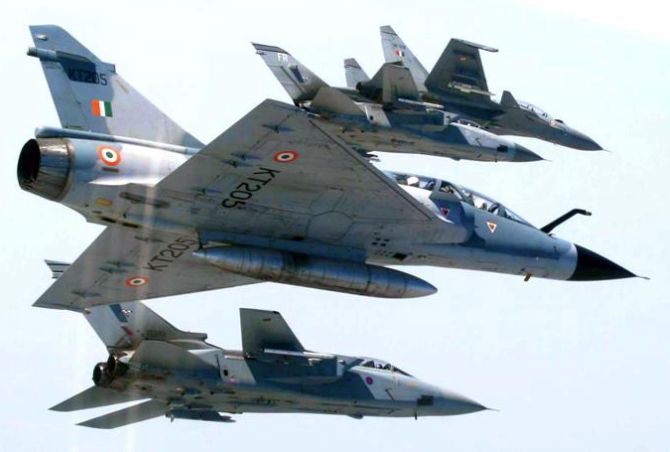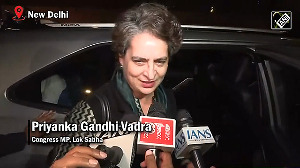'With the Balakot strike, India has established a precedent for response to any new terrorist attack engineered by Pakistan.'
'This will stay irrespective of who wins the coming elections,' says Colonel Anil A Athale (retd).

In this election season, major security related developments have been viewed from a partisan view point. It is like three blind men describing the elephant as a pillar, a rope or a snake, since the blind men could not see the full picture.
These were momentous events and will have a lasting impact on Indian national security for a long time to come.
It is necessary that every common citizen understands the full implications of what has happened.
The Balakot airstrike in response to the Pulwama attack was indeed a 'game changer' in India-Pakistan relations.
Analysts like me and many others have been crying hoarse for several decades that India needs to embrace the strategy of 'counter terror' and not just anti-terror.
Let me explain it in plain terms. All through the 1980s to the 21st century, after every terror attack traceable to Pakistan, India responded with anti-terror measures.
We increased CCTV coverage, created counter terror special forces, fenced the border and tried to tackle Pakistan diplomatically. This was true after the 2006 Mumbai train bombings as well as the 26/11 Mumbai attacks.
Even earlier, India's response even to the Kargil intrusion was 'defensive' in nature. We recovered our lost territory, but did not cross the LOC.
Although a grave provocation like the December 2001 attack on Parliament by Pakistan-based Jaish e Mohammad terrorists evoked a strong response and we mobilised the armed forces for a conventional war, India did back out ultimately.
If we are to understand the Pakistani strategy as proxy war, then we are essentially confined ourselves to 'defence' only. It is well understood by all students of war that one can never win a war with a purely defensive strategy. But that is precisely what India has been doing for the last 30 years.
Pakistan has been successfully using the strategy (called the 'Mad Mullah' by the Washington Post) of deterring India by threatening 'irrational' responses and invoking the specter of nuclear war.
With the air strike on the Balakot terror camp in mainland Pakistan (not just the disputed territory of Jammu and Kashmir) India has called the Pakistani bluff.
Irrespective of the damage done at Balakot, the air strike has established a new red line in the sub-continent. Why that is so needs an explanation.
We are too close to events and no official will reveal exactly what happened, so an educated guess is possible.
When India decided on launching the air strike, a possibility of Pakistani reaction must have been factored in. India must have put plans in operation for a ground attack on Pakistan as well as attack from the sea.
To back up this threat and deter Pakistan from escalating the conflict, India must have also put its nuclear forces on alert. As a matter of fact, these forces must be still on alert even to date March 29, a month after the Balakot strike.
It is unlikely that the level of alert will be lowered before the end of elections in India and a mutual stand-down by both the countries.
Pakistani Prime Minister Imran Khan alluded to this fact when on March 26, 2019, he stated that war clouds are yet to dissipate.
With the Balakot strike, India has now established a precedent for response to any new terrorist attack engineered by Pakistan. This will stay irrespective of who wins the coming elections.
In one stroke India has re-established the credibility of its deterrence.
Far from making a nuclear war possible, this has actually diminished its possibility as Pakistan will now have to think twice before permitting Jaish or Lashkar e Tayiba to repeat a Mumbai 26/11 like terror attack.

Closely following on its Balakot success, India on March 27 tested an anti-satellite missile successfully. The test showed that India is steadily moving towards Ballistic Missile Defence.
This will further reinforce our deterrence ability as Pakistani's first strike strategy becomes problematic.
Much more needs to be done in the field of air defence, but suffice it to say that through the anti-sat missile test, India has shown that it is in a different league from Pakistan.
Anti-satellite missile technology is a closely guarded secret and it is unlikely that China will share it with Pakistan. As time passes, the gap between India and Pakistan will only increase.
This will hopefully lead Pakistan to pursue a more realistic defence posture and force it to give up its quest for strategic parity with India.
This will be the first step towards 'détente' in our region.
Colonel Anil A Athale (retd) is a military historian.










